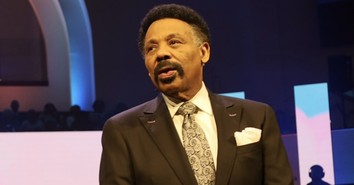Muslim Life on U.S Warship Changes

ABOARD THE USS ENTERPRISE (AP) - After Sept. 11, crewmates stared, silence replaced greetings and life for some of the 50 or so Muslims aboard this U.S. aircraft carrier changed.
But the giant ship's Muslim chaplain said it wasn't long before a sense antagonism was replaced by curiosity and then - to a degree - by understanding.
``More questions have come up, and people want to understand how, why and what is Islam about as a religion,'' said Lt. Muhiyyaldin, the chaplain. ``I applaud them because they want to come learn.''
Fewer than 20 of the Muslim sailors aboard the floating airfield are observant, said the lieutenant, the first Muslim chaplain in the Navy and one of 12 in the U.S. armed forces as a whole. The military forbids using last names of those involved in the attacks to guard against potential retaliation against them or family members at home.
Muhiyyaldin, known to shipmates as ``Chaps'' and raised as a Baptist in Salem, N.J., converted to Islam at age 21. He's served in the military more than 22 years, the last six as a chaplain.
On Sunday night, when the USS Enterprise, deployed in the Arabian Sea, sent its fighter jets to Afghanistan, opening the military campaign in America's war on terrorism, Muhiyyaldin delivered the evening prayer.
``The ghosts of tyranny and theocracy and wanton violence still linger, having left their indelible mark upon our common past,'' he said. The message, ``A Prayer for Comrades in Arms,'' was his first titled invocation to god.
The chaplain said he's lost count of the number of people have come to him with questions about Islam in the past month. When pressed, he put the number in the hundreds. There are 5,100 sailors on board the Enterprise.
``I think whenever you suffer what we suffered on Sept. 11 there will be a host of emotional experiences and sometimes those emotions spread out as emotions do without much thought,'' he said.
``So, there have been some stares, there have been words that used to be passed, greetings and handshakes that were missed, but only briefly.''
Ousmane, a 29-year-old Muslim originally from Dakar, Senegal, said shipmates ``kind of look at you,'' but that his friends and co-workers in the disbursement office know him and have treated him no differently.
Osama bin Laden, terror attacks and Islam do come up, Ousmane says, but not in anger.
``People, most of the time, asked me if I believed in the same stuff as they do - the terrorists,'' he said.
The questions, he said, sometimes are so basic as whether a Muslim can have four wives and why.
``We kind of talk about it, argue, discuss - I didn't feel animosity.''
Ousmane won a resident's green card in a 1998 Immigration and Naturalization Service lottery. He joined the Navy four months later.
Fellow Muslims have adopted a low profile since the terror attacks on New York and the Pentagon a month ago, he said. Sometimes they have kept silent to his typical greeting of ``salaam aleikum'' - the Muslim greeting that means peace be upon you.
Chaplain Muhiyyaldin said he's turned down requests from non-Muslims who have asked to read his Quran, the Islamic holy book, to find passages that would explain how believers could resort to terrorism and find justification in Islam.
Relevant passages, he feared, would be misinterpreted in the atmosphere of anger that has sprung up since Sept. 11.
Instead, the chaplain said, he has discussed Quranic passages that forbid the killing of the innocent or attacking enemies without warning.
But not all the anger among non-Muslim's has diminished.
Bombs being strapped to fighter planes and intended for Afghan targets carry graffiti scribbled by soldiers. Most messages pay tribute to the victims of the World Trade Center and Pentagon attacks.
Muslim believers, able to take part in the attacks so far, may have more trouble if the United States broadens the strikes to include other Islamic nations.
``They are my brothers,'' Ousmane said. ``I'm in the middle. I'm one of those people who doesn't believe in war.''
Chaplain Muhiyyaldin has considered the dilemma as well. He said his faith rejects participation in attacks on fellow believers, on the one hand. On the other, he said, he can support attacks on anyone whose acts ``profaned Islam.''
So, has the U.S. military done anything so far that his Muslim faith prohibits?
``Not yet,'' he answers.

Originally published October 10, 2001.







